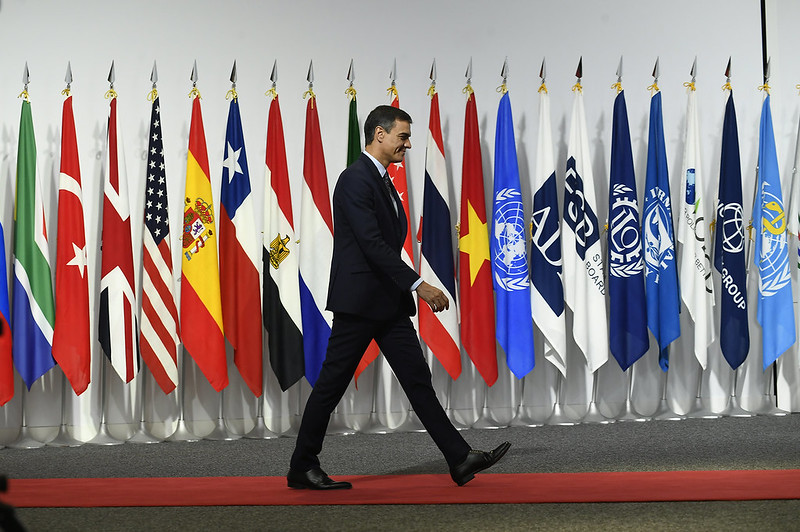
‘All politics is local’, observed Tip O’Neill, speaker of the US House of Representatives in the 1980s. Foreign policy and domestic politics and policy are intimately linked. Thus, the foreign arena is used to defend domestic interests, and the course of domestic politics determines various factors abroad. This involves the participation of increasing numbers of actors, not only the government but also companies, civil society, regions and cities. Spain has a great deal at stake in this two-way relationship between the domestic and foreign.
Let’s start with an example. The US has taken commercial retaliation, based on a ruling delivered by a World Trade Organisation panel, against the countries that participate in Airbus, for illegal state subsidies, Spain being one of the countries concerned. This has involved tariffs on a range of products imported into the US, including foodstuffs such as wine and olive oil. It is a legal response, but farmers do not understand why they must pay for the misdeeds of an aircraft manufacturer. For some time the Spanish government made discreet efforts to negotiate the lifting of the tariffs. But, after widespread protests among a hard-hit section of the Spanish farming community, it has sent a message to the Trump Administration: if it wants to continue relying on an already significant and growing degree of military cooperation with Spain (not only the bases, which have been taken for granted in Washington for years, but other aspects), it will need to cancel its tariffs. Who remembers that in the negotiations to join what is now the EU, the then German Foreign Minister, Hans-Dietrich Genscher, said that ‘we cannot ask Spain for its soldiers (for NATO) and reject its oranges’? There is the prospect of another dispute in a similar case: the forthcoming WTO sentence against Boeing for similar reasons could enable the Europeans to take retaliation against the US, in an absurd exchange of hostilities. In Trump’s trade dispute with China, the latter retaliated against agricultural products grown in states essential to Trump’s re-election, who, with his highly transactional mentality, backed down in part.
The credibility of the current Spanish government’s foreign policy depends not only on its capacity to forge relations and alliances and to further proposals, of undoubted importance, but also certain elements of domestic policy that are being subjected to the scrutiny of its partners and others. The first is Catalonia. Both the Sánchez and the earlier Rajoy administrations won the foreign diplomatic battle against the Catalan independence movement, something no government of any major country supported or supports. The same cannot be said of foreign public opinion. But foreign governments and public opinion also gave impetus to dialogue on the domestic stage, and they are relieved to see that this dialogue is now under way. And this also improves Spain’s international position.
Martin Sandbu recently said that ‘what the country does domestically will affect what it can do on the bigger stage’. And warned that ‘while economic strength buys political capital, the economy itself starts and ends with the politics’. Rajoy’s reputational stock fell sharply in Angela Merkel’s eyes with his cases of corruption.
The push towards a domestic policy aimed at tackling climate change within the framework of, and consistent with, the new green deal that the EU and the rest of the world are working towards is another of these factors. In a connected way, against the background of major industrial, social and cultural upheaval, Spain is also being judged for its R&D&i policy, both public and private. Many European governments could never understand Spain’s decision, over many years of crisis, to cut funding in this area, and in education, which were investments in the future, while maintaining investments in infrastructure that was not strictly necessary. This is linked to another domestic issue in which Spain, viewed at close quarters, is staking its credibility: the persistently high level of unemployment, especially youth unemployment. The proposals for employment reform are also the subject of scrutiny. Lastly, the public accounts and the forthcoming spending plans will be examined, although here the EU is looking at relaxing the strict rules of the stability pact.
After many months on a provisional footing, naturally another important factor is the stability of a government that, if it can get its budget approved, has its future assured for some years to come. A government that, after years of national self-absorption, has rediscovered that much of what is at stake domestically is determined abroad. There will however be a difficulty, namely the use that the opposition may make of its criticisms of foreign policy to try to make inroads domestically. Greater consensus would be advisable, especially in the European arena amid the prospect of a new multiannual financial framework agreement, which is going to be of extraordinary importance to Spain and the whole of the EU, since this is what will set new priorities.
The departure of the UK changes the balances of power in the EU and beyond, and creates new opportunities for Spain to exert more influence, or rather, to exert more influence once again, to change and get the most out of a Union that faces new geopolitical and geo-economic realities. Moreover, Pedro Sánchez has become the foremost representative of a political tradition that has been essential to EU construction, albeit one that has seen better days, namely the social democratic tradition. Spain is awaited in Paris, Berlin, Brussels and other parts of Europe and the world. And Europe and the world are awaited in Spain. Here it is worth recalling the words of Tip O’Neill. The credibility of domestic politics has a bearing on foreign policy.


